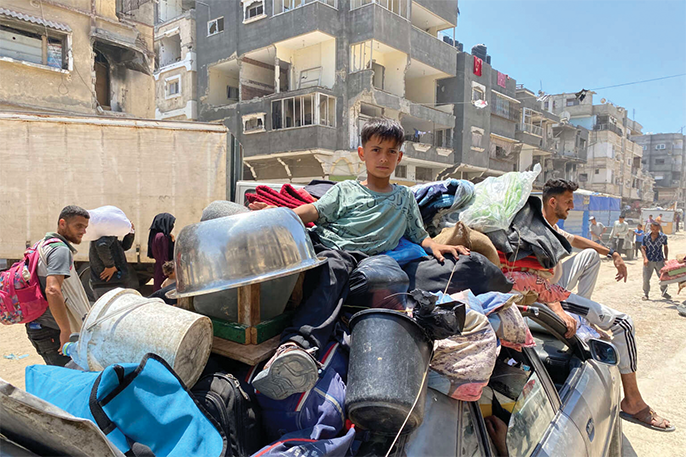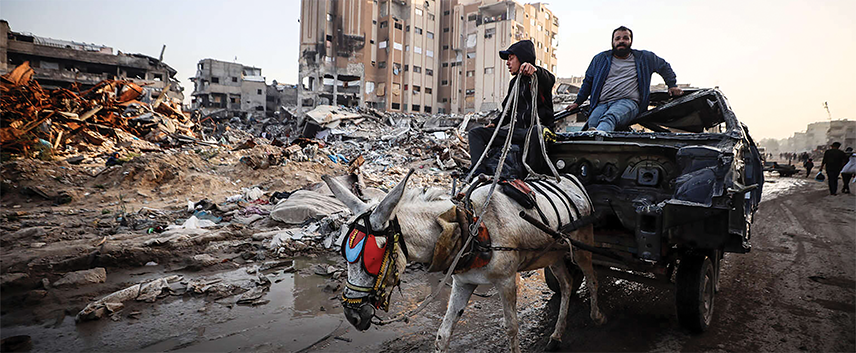SURVIVAL: Protecting donkeys helps protect the people who depend on them to survive the ongoing crisis, says a Gaza veterinarian…
By Shahad Ali
Israel’s genocide in Gaza has transformed donkeys from an outdated mode of transportation — once seen mostly in impoverished or agricultural areas — into the only remaining means of transportation for many.

With most vehicles destroyed and fuel prices soaring, people have been left with no choice but to rely on donkeys to access basic services and transport their belongings when Israeli forces issue new evacuation orders.
Ranya Hammoda (44) said she was initially embarrassed to ride in a donkey cart, but it has now become part of her daily routine.
“I have asthma, and I can’t walk long distances because I start to feel short of breath and my chest tightens,” she said.
“The donkeys have made it easier for me to get my necessities and visit the clinic which is three kilometres away from my area for my asthma medication.”
Yaser Alyazori (48) described donkeys as lifesavers. “Each time we receive an evacuation order, I rely on a donkey cart to transport my family and the essential items we desperately need — food, water gallons, clothes, and blankets,” he said.
“It’s incredibly difficult to walk for long distances under heavy bombardment while carrying heavy loads and caring for my children. Without donkeys, I can’t even imagine what our lives would be like.”
The use of donkeys in Gaza has expanded to cover nearly every aspect of our lives. They have become makeshift ambulances, transporting the injured, the dead, and even pregnant women to hospitals — especially in areas so severely destroyed that ambulance vehicles cannot pass through bombed and rubble-filled streets. Their ability to navigate these devastated zones has helped save precious time and countless lives.
Yasen Nassar (20) said that during the Israeli invasion of the al-Shujayya neighborhood in December 2023, he used his donkey cart to carry dozens of injured people to the hospital. He explained that artillery shelling targeted a school used as a shelter for displaced families, resulting in many deaths and injuries.
“People repeatedly called for ambulances, but they kept saying they couldn’t reach the area. Every passing minute meant losing lives,” he said.
“We could not wait any longer. I carried the injured in my donkey cart and rushed them to the hospital, where they received medical care, and some of them survived.”
In addition to their role in emergencies, donkey carts became vital in clearing debris from homes and streets. They also assist in transporting goods and produce still grown in Gaza’s remaining agricultural lands, carrying them from the south to the north — and vice versa — to reach markets and families in need across the Strip.
However, the intense demands and the harsh conditions of working in a war zone have taken a heavy toll on these animals. They work more than nine hours a day, walking through rubble-filled and destroyed streets while carrying loads that can weigh up to a ton.
In addition, the severe shortage of proper fodder and veterinary medicine has left these donkeys emaciated and sick.
Mohamed Ali, a 24-year-old veterinarian, explained that donkeys require proper nutrition to carry out their work effectively. Their diet should contain protein and ingredients such as barley, bran, yellow corn, and compressed fodder rich in minerals and vitamins.
However, the Israeli blockade has blocked the entry of these essential supplies into Gaza. As a result, donkey owners now struggle to feed their animals and are forced to rely on poor substitutes like rotten bread, expired flour, and lentils.
Ali added that this type of food harms the donkeys’ health, causing weight loss and leaving them weak and frail. It also leads to muscle tissue wasting and prevents the donkey from working for long hours.
In addition, this food is difficult for the donkeys to digest, resulting in intestinal distress, bloating, and pressure on the diaphragm, along with gas build-up in the bladder — issues that can ultimately lead to the donkey’s death.
Ali explained that donkeys typically receive vaccinations and antibiotics such as Ivomec to protect them from intestinal worms and skin diseases like mange.
However, none of these medications are currently available. He added that one of the most common skin conditions now affecting donkeys is caused by flies, mosquitoes, and the heavily polluted environment. Constant biting forces the animals to scratch themselves against any hard surface to relieve the irritation, leading to skin damage, hair loss, and the development of black patches.
Ali noted that this condition requires specialised ointments and medications, but due to the blockade, they are no longer accessible. As a result, donkey owners have been forced to resort to primitive methods, such as rubbing the donkey’s body with kerosene to repel flies or covering it with cloth for protection.
In addition, Ali mentioned that most of the donkeys in Gaza are suffering from wounds and injuries, either due to the war or from being beaten with sticks and plastic pipes. He added that the lack of antibiotics, disinfectants, and iodine — along with poor nutrition — prevents the wounds from healing, often leading to infections, wound decay, and tissue damage.
“If this situation continues, more and more donkeys will die, adding to many that have already perished because of the Israeli war,” said Ali. “The conditions they endure are unbearable. They work for hours under harsh circumstances and receive nothing in return — no proper food, no veterinary care.
“These animals have become the last lifeline for people in Gaza. They ease our suffering and help us access essential services. Protecting them is, in fact, protecting the people who depend on them to survive amid this ongoing crisis.” – Truthout
* Shahad Ali is an English literature student and writer from Gaza


































